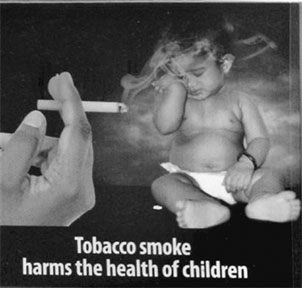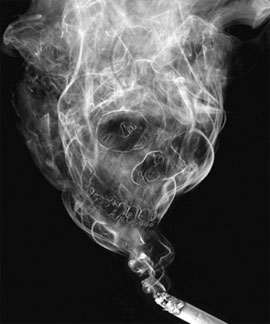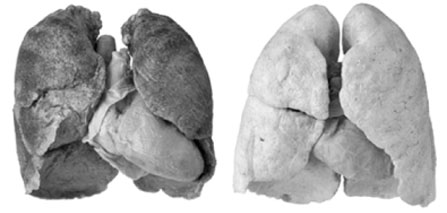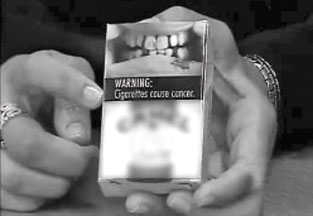|
World No Tobacco Day on Thursday:
Protecting future generations from the deadly menace
by Manjari PEIRIS
Tobacco industry interference’ is the theme selected by the World
Health Organization (WHO) for the World No Tobacco Day on Thursday.
  The purpose of celebrating the World No Tobacco Day on May 31 every
year is to increase public awareness regarding the hazards of tobacco
use, inform consumers about the business strategies of the tobacco
industry and trade, spread the message about WHO initiatives for
anti-tobacco campaigns, promote healthy lifestyles and habits among
people as well as to devise ways to protect the future generations from
tobacco use. The purpose of celebrating the World No Tobacco Day on May 31 every
year is to increase public awareness regarding the hazards of tobacco
use, inform consumers about the business strategies of the tobacco
industry and trade, spread the message about WHO initiatives for
anti-tobacco campaigns, promote healthy lifestyles and habits among
people as well as to devise ways to protect the future generations from
tobacco use.
The campaign this year will focus on the need to expose and counter
the tobacco industry's unashamed and increasingly aggressive attempts to
undermine the WHO Framework Convention on Tobacco Control (WHO FCTC)
because of the serious danger they pose to public health.
Director General of the World Health Organization Dr. Margaret Chan
has said: “It is horrific to think that an industry known for its dirty
tricks and dirty laundry could be allowed to trump what is clearly in
the public’s best interests. Big Tobacco can afford to hire the best
lawyers and PR firms that money can buy. Big money can speak louder than
any moral, ethical or public health argument and can trample even the
most damning scientific evidence. I urge all these countries to stand
firm together, do not bow to pressure... we must never allow the tobacco
industry to get the upper hand.”
Tobacco use is one of the leading preventable causes of death. The
global tobacco epidemic kills nearly six million people each year, of
which more than 600,000 are those exposed to second-hand smoke. Unless
we act, it will kill up to eight million people by 2030, of which more
than 80 percent will be from low- and middle-income countries. As more
countries move to fully meet their obligations under the WHO FCTC, the
tobacco industry's efforts to undermine the treaty are becoming more
energetic.
Pictorial health warnings
The industry recently adopted the novel tactic of suing countries
which have attempted to use pictorial health warnings on packages of
tobacco, under bilateral investment treaties, claiming that the warnings
impinge the companies’ attempts to use their legally-registered brands.
The Framework Convention on Tobacco Control required parties to the
treaty to implement the regulation on warnings, to cover at least 50
percent of the pack with pictorial health warnings highlighting the
harmful effects of smoking.
Though Sri Lanka is a party to the treaty, and ratified the FCTC in
2003 as the first Asian country, it is now four years behind the
prescribed schedule. The Mathata Thitha program of Mahinda Chinthana has
taken many commendable steps to curb cigarette smoking in Sri Lanka,
viz. a comprehensive advertising ban on tobacco products, cigarette
sales to minors and smoking at “enclosed public places”.
We understand that the delay in implementation of the pictorial
health warning regulation is due to the setback of the Department of the
Legal Draftsman. The Minister of Health specifically highlighted this
fact through the media recently. However, it should happen somehow as we
need to halt the untimely deaths occurring every year in Sri Lanka due
to tobacco use. It is fairly a high figure – 20,000 deaths in a
population of 20 million.
 We need to know that throughout the world, the industry has been
involved in interfering in health policy matters to delay important
tobacco control policies by influencing government officials using
different strategies. Thus, industry interference in policy matters
related to health matters should never be allowed. We need to know that throughout the world, the industry has been
involved in interfering in health policy matters to delay important
tobacco control policies by influencing government officials using
different strategies. Thus, industry interference in policy matters
related to health matters should never be allowed.
Immediate implementation
The public has urged the authorities to look into this important
matter of the vast damage caused through cigarette smoking in this
country and to probe who is causing this delay for the immediate
implementation of the regulations on pictorial health warnings on
tobacco products.
Meanwhile, the industry's attempts to undermine the treaty continue
on other fronts, particularly with regard to countries’ attempts to ban
smoking in enclosed public places and ban tobacco advertising, promotion
and sponsorship.
The World No Tobacco Day 2012 will educate policy-makers and the
public about the tobacco industry's destructive tactics.
It will also be in keeping with the letter and the spirit of the WHO
FCTC. The preamble of the treaty recognises “the need to be alert to any
efforts by the tobacco industry to undermine or subvert tobacco control
efforts and the need to be informed of activities of the tobacco
industry that have a negative impact on tobacco control efforts”.
In addition, Article 5.3 of the treaty states that “in setting and
implementing their public health policies with respect to tobacco
control, Parties should act to protect these policies from commercial
and other vested interests of the tobacco industry in accordance with
national law”.
The guidelines to the implementation of Article 5.3 state that
Parties are recommended to “raise awareness about… tobacco industry
interference with Parties’ tobacco control policies”.
Global tobacco epidemic
On World No Tobacco Day 2012, and throughout the following year, WHO
will urge countries to put the fight against tobacco industry
interference at the heart of their efforts to control the global tobacco
epidemic.
Understanding the tobacco industry's practices is crucial for the
success of tobacco control policies. In this context, it's important
also to understand that tobacco products are the only legally available
products that can kill up to one half of their regular users if consumed
as recommended by the manufacturer.
 |
|
Blackened smoker’s
lungs (left) and a set of healthy lungs |
There is a fundamental and irreconcilable conflict between the
tobacco industry’s interests and public health policy interests.
Therefore, Parties to the Framework Convention on Tobacco Control of the
World Health Organization should protect the formulation and
implementation of public health policies for tobacco control from the
tobacco industry to the greatest extent possible.
Health advocates and public health officials around the world agree
that the tobacco industry should have no influence on public health
policies as its business interests directly conflict with the goals of
public health. The FCTC enshrines this concept in international law for
the first time.
Countries that have signed and ratified the FCTC are required to
reflect its principles in their national legislation and policies. The
importance of implementing the Article 5.3 of the FCTC cannot be
over-emphasised for the fact that the tobacco industry is a potent enemy
for those who want to support a smoke-free environment in a country
which is of paramount importance to maintain the good health of people.
Guidelines for implementation
Use of the guidelines for implementation of Article 5.3 of the
Convention will have an overarching impact on countries’ tobacco control
policies and on the implementation of the Convention, because the
guidelines recognise that tobacco industry interference, including that
from the State-owned tobacco industry, cuts across a number of tobacco
control policy areas, as stated in the Preamble of the Convention,
articles referring to specific tobacco control policies and the Rules of
Procedure of the Conference of the Parties to the WHO Framework
Convention on Tobacco Control.
 |
|
Pictorial warnings |
The purpose of these guidelines is to ensure that efforts to protect
tobacco control from commercial and other vested interests of the
tobacco industry are comprehensive and effective. Parties should
implement measures in all branches of government that may have an
interest in, or the capacity to, affect public health policies with
respect to tobacco control. The guidelines draw on the best available
scientific evidence and the experience of parties in addressing tobacco
industry interference.
The guidelines apply to persons, bodies or entities that contribute
to, or could contribute to, the formulation, implementation,
administration or enforcement of those policies and are applicable to
government officials, representatives and employees of any national,
state, provincial, municipal, local or other public or semi/quasi-public
institution or body within the jurisdiction of a party, and to any
person acting on their behalf. Any government branch (executive,
legislative and judiciary) responsible for setting and implementing
tobacco control policies and for protecting those policies against
tobacco industry interests should be accountable.
We should never forget the fact that the tobacco industry produces
and promotes a product that has been proven scientifically to be
addictive, to cause disease and death and to give rise to a variety of
social ills, including increased poverty. Therefore, Parties should
protect the formulation and implementation of public health policies for
tobacco control from the tobacco industry to the greatest extent
possible.
|

